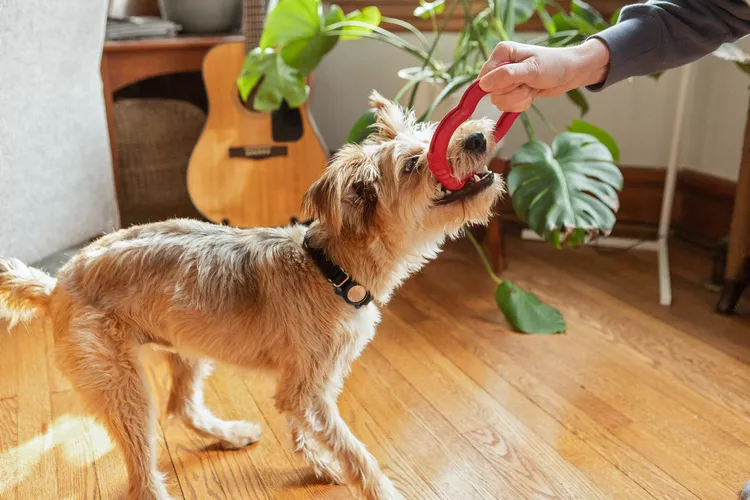
Sudden aggression in your dog can be a scary situation for any pet parent. If your adult dog has been with you for a while, you can usually predict their behavior in various types of situations—and you don't expect them to become irritable. If your happy, loving dog suddenly exhibits aggressive behavior for no obvious reason, we're here to help.
The key to dealing with this behavioral change is to first try to determine the cause. At the same time, it's important to keep your dog, as well as your human friends, family, other pets, and yourself, safe by seeking the help of your veterinarian right away.
In the meantime, handle the dog in a careful, non-threatening way and take action to manage the aggression until you're able to figure out what's causing it and ideally find a safe, workable solution.
Dog aggression toward people may involve a variety of behaviors such as barking, lunging, snarling, growling, snapping, nipping, and biting. Dogs can also have reactivity on leash, which occurs when they're on walks and may include lunging, pulling, and barking, mostly at other dogs.
It's not normal when a happy dog suddenly exhibits aggressive behavior for no obvious reason. If you take a closer look, always enlisting the help of your vet and a positive reinforcement-based dog trainer, you may be able to figure out the cause of your dog's behavior change.
Fear can elicit sudden behavioral and temperament changes such as aggression. If the aggression is temporary, it might be that your dog is simply reacting to a perceived threat. However, it's still important to figure out why your dog reacted so you can help your dog not react to those situations in the future.
Many common health problems can also affect your dog's personality, and some can be serious. This is especially common as your dog becomes a senior and begins to develop age-related diseases. In some cases, sudden aggression in an older dog may be related to canine cognitive dysfunction or dementia.
If your dog's aggression is accompanied by other symptoms, like hair loss, weight gain, or lethargy, it could be a sign of hypothyroidism. If accompanied by convulsions or rapid mood changes, it could be from seizures. Brain damage to specific areas of the brain from tumors, thyroid issues, and trauma can also result in aggression problems.
An ear infection could be the culprit if your dog suddenly becomes aggressive in the presence of loud noises. If eating makes your dog grumpy, a dental issue may be the cause.
An injury could be the source of your dog's sudden aggression, and something you might not have realized your dog experienced because of their ability to hide pain. To explore this possibility, start with a cursory physical exam. Look for swelling, cuts, torn paw pads, insect stings, or tender spots. Anything that looks out of the ordinary could be hurting your dog and causing aggression.
Check the inside of your dog's mouth (if you feel safe doing so) to see if a foreign object may be causing the aggression. It might be a daunting prospect if the dog is feeling snappy, but the problem could be something as simple as a piece of food, toy, or stick caught in your dog's teeth. If your dog threatens you in any way, though, leave the oral exam up to your veterinarian.
Take note of any other symptoms, such as vomiting, diarrhea, loss of appetite, and lethargy, and write this information down so you can share it with your veterinarian.
Working to stop your dog's sudden aggression is very important for both you and your dog's overall happiness. Start with ruling out health issues, then enlist the help of a professional to help you pinpoint the cause of the aggression and work to overcome it.
The vet will discuss your dog's medical and behavioral history and perform a complete physical examination. The goal is to first rule out injuries and other medical problems. Blood and urine tests may be necessary to assess your dog's blood cell counts and organ function. Radiographs may also be needed to locate the source of the problem.
If your vet is unable to find a medical issue, seek the assistance of a certified canine behaviorist. An animal behavior professional can help you work with your dog using techniques such as behavior modification, conditioning, and desensitization and can also help you decide whether the risk of living with your dog is too great and euthanasia is justified.
While you're working through an aggression issue with your dog, it's best to limit exposure to strangers, other dogs, or young children. A no-visitor and no-petting rule is best. Also, don't leave your dog unattended, and keep them on a leash at all times while you're on walks, in a park, or anywhere else. It's not worth risking a dog bite or potential scare from your dog while you work through aggression and reactivity.

Cute Pictures & Facts About Calico Cats & Kittens
Learn fascinating facts about calico cats, including photos, the genetics behind this color combination, and common folklore and traditions.
How to Prevent Cat Separation Anxiety During Vacations
Discover why cats develop litter box problems and cat behavior problems when you go on vacation and what you can do about it to help them.
Cat Behavior Changes That Might Mean Something's Wrong
Cats' behavioral changes may indicate problems—or they may mean nothing at all. Explore causes of odd behavior and what to do about them.
Lhasa Apso: Dog Breed Characteristics & Care
The Lhasa apso is an ancient breed from Tibet that was bred to be a watchdog. Learn about its history, health, exercise needs, and more.
Reasons Why Dogs Run Away and How to Stop It
Dogs can escape, especially if they’re bored and not properly contained. Here are some techniques for stopping your dog from running away.
Can Dogs Get Depression? How to Help Your Sad Dog
Can dogs get depression? Learn about the signs of depression in dogs and find out how to help your sad dog.
How to Stop Aggression in Dogs
Dog aggression can be a serious behavior issue for pet owners. Learn how to stop aggression in dogs before someone gets hurt.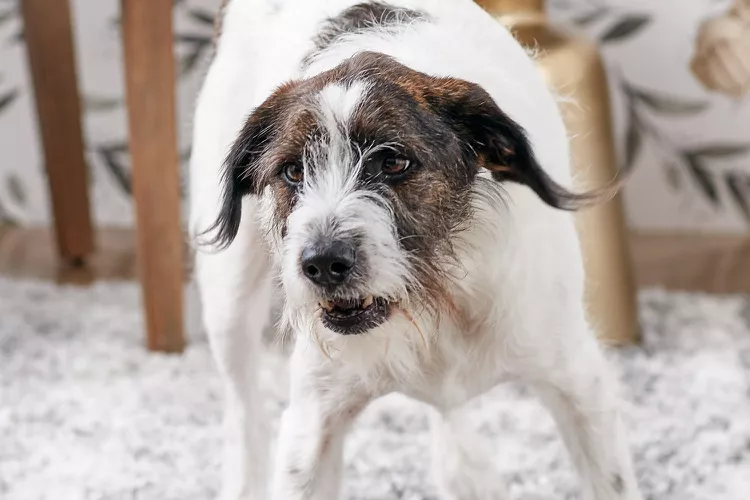
How to Stop Your Dog From Growling
A growling dog can soon become even more aggressive. Reduce the noise and potential for a dangerous situation with some of these techniques.
Why Do Dogs Dig Holes? How to Stop Your Dog from Relandscaping Your Yard
Dogs have been digging holes for centuries and for many reasons. Whether they’re bored or want to cool off in the dirt, here are the top reasons why dogs dig holes.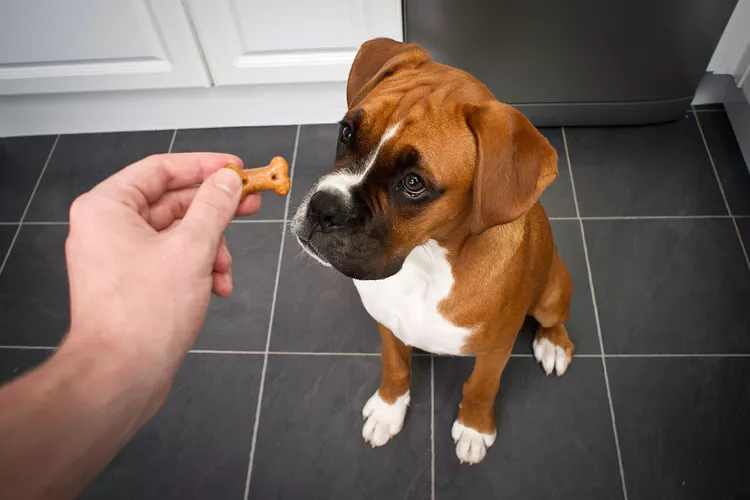
Dog Treat Varieties
Learn about the different types of dog treats on the market and decide which are best for your dog.
Can Dogs Eat Asparagus?
Dogs can eat asparagus, provided the vegetable is cooked plain and cut up for them. Seasonings, salt, and butter make it unhealthy for dogs.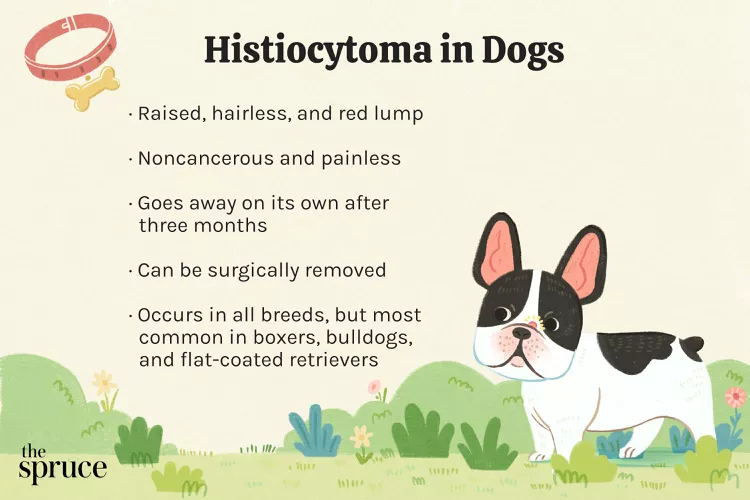
Histiocytomas in Dogs
A histiocytoma is a type of benign (non-cancerous) skin lump that usually affects young dogs. Learn the causes, treatment, and prevention.
Why Is My Dog’s Eye Swollen?
If your dog's eye is swollen, she may need veterinary attention. The inflammation could be caused by allergies, an injury, or even a tumor.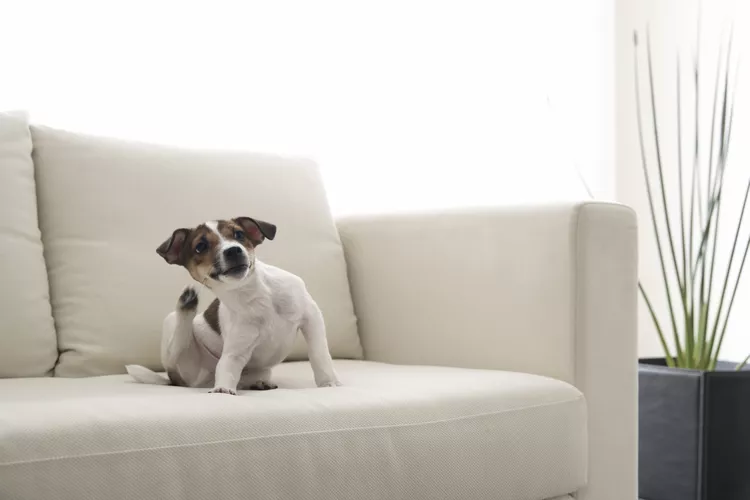
Common Bugs and Parasites Found on and Inside Dogs
Learn about common types of parasites in dogs. Find out how to treat and prevent parasites to keep your dog, your family, and yourself safe.
Exploring the Different Types of Pet-Friendly Beaches
Are you looking for pet-friendly beaches? Learn about the different types of pet-friendly beaches, their locations, and tips for visiting them with your pet.
10 Obscure, Little-known Canine Facts in Honor of National Dog Day
With National Dog Day upon us, it's time to celebrate everything about our favorite pets—even the weirder stuff. Here are 10 obscure facts about dogs you probably didn't know.
Kitten Development From 3 to 6 Months Old
Kittens grow and change a lot during their first year. Find out what happens between the ages of three months and six months old.
95 Siamese Cat Names
Our list of Siamese cat names has diverse and fun options to help you choose the ideal moniker for your elegant and lovable feline companion.
What to Buy for Your New Cat: A List of Essentials
Before you bring your new cat or kitten home, there are a number of things to collect or buy so your cat will feel welcomed like a family member.
The 6 Best Cat Nail Clippers of 2024 for a Safe Trim
Clipping your cat's nails can save your furniture and keep your kitty comfortable. We asked veterinarians for their cat nail clipper recommendations.